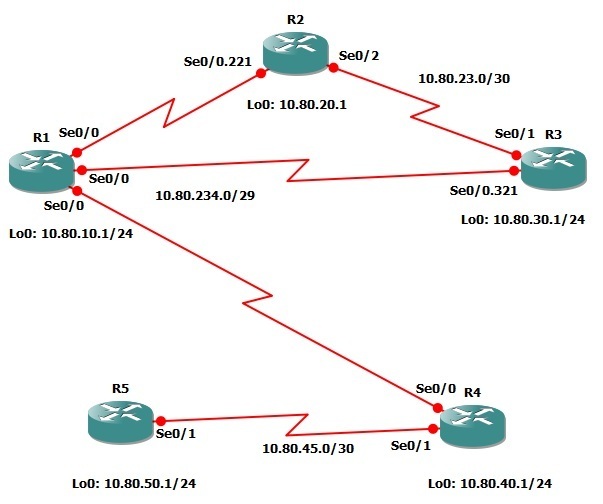In this lab you will learn how to configure an Enhanced Interior Gateway Routing Protocol (EIGRP) summary route to conserve router resources on upstream neighboring routers.
Real World Application & Core Knowledge
If you completed Lab 7-8 – Configuring RIP Route Summarization then you should have a basic understanding of how route summarization works. If you did not then to sum it all up; its basically the operation at which you subnet different subnets into a single larger subnet which gets advertised to neighboring routers to conserve router resources. For example, if you advertise a /22 subnet which encompasses four single /24 networks then you’re effectively cutting the resource requirements of neighboring routers by 75%; in which case an upstream router will have a single /22 route instead of four /24 routes to the same geographic location.
Configuring a summary address for EIGRP is done on a per interface basis uses practically the same command as configuring a summary address for RIP however there is a slight difference. When configuring a summary address on an interface for EIGRP you’ll use the ip summary-address eigrp AS# n.n.n.n s.s.s.s.s command whereas RIP uses the ip summary-address rip n.n.n.n s.s.s.s
Another benefit of using summary routes (aka: route aggregation) is if a single route goes down that is contained within a summary route, updates are not sent throughout the entire routed domain. Only the router advertising the summary route will know that the more specific route has went down. For EIGRP, this will prevent unwanted queries and potentially SIA in the EIGRP autonomous system.
In this lab you will configure four new loopback interfaces on R1 and configure a summary route on R1 advertised out the Frame-relay hub-and-spoke interface as well as the point-to-point interface towards R2.
Familiarize yourself with the following new command(s);
ip summary-address eigrp AS# n.n.n.n s.s.s.s.s – This command is executed in interface configuration mode to configure an EIGRP summary route to be advertised out a specific interface.
This lab will continue to build upon the topology previously used in Lab 8-7 and other labs found through out Section 8.
Lab Prerequisites
• If you just completed Lab 8-7 you may start where you left off, if not you can load the Free CCNA Workbook GNS3 topology; start and establish a console session with R1, R2, R3, R4 and R5 then load their initial configurations included below by copying the config from the textbox and pasting it into the routers console.
Initial Configurations
Lab Objectives
• Configure four new loopback interfaces on R1 using the numbers 4-7, configure these interfaces with the ip address range 10.122.4.0/22. Tip: The 3rd octet as the interface number.
• Configure a single network statement to encompass the four newly created loopback interfaces.
• On R1 configure a summary address of 10.122.4.0/22 to be advertised out both the frame-relay hub-and-spoke interface.
• Verify the summary address is being propagated correctly by viewing he routing table on R5.
Lab Instruction
Objective 1. – Configure four new loopback interfaces on R1 using the numbers 4-7, configure these interfaces with the ip address range 10.122.4.0/22. Tip: The 3rd octet as the interface number.
R1>enable |
Objective 2. – Configure a single network statement to encompass the four newly created loopback interfaces.
R1(config)#router eigrp 10 |
Objective 3. – On R1 configure a summary address of 10.122.4.0/22 to be advertised out both the frame-relay hub-and-spoke interface.
R1(config)#interface Serial1/0 |
Objective 4. – Verify the summary address is being propagated correctly by viewing he routing table on R5.
R5>show ip route
Codes: C - connected, S - static, R - RIP, M - mobile, B - BGP
D - EIGRP, EX - EIGRP external, O - OSPF, IA - OSPF inter area
N1 - OSPF NSSA external type 1, N2 - OSPF NSSA external type 2
E1 - OSPF external type 1, E2 - OSPF external type 2
i - IS-IS, su - IS-IS summary, L1 - IS-IS level-1, L2 - IS-IS level-2
ia - IS-IS inter area, * - candidate default, U - per-user static route
o - ODR, P - periodic downloaded static route
Gateway of last resort is not set
10.0.0.0/8 is variably subnetted, 13 subnets, 5 masks
C 10.55.50.0/24 is directly connected, Loopback0
D 10.55.40.0/24 [90/2297856] via 10.0.45.1, 01:43:54, Serial1/1
D 10.0.23.1/32 [90/3705856] via 10.0.45.1, 01:43:54, Serial1/1
D 10.0.23.0/30 [90/3705856] via 10.0.45.1, 01:43:54, Serial1/1
D 10.0.23.2/32 [90/3705856] via 10.0.45.1, 01:43:54, Serial1/1
D 10.55.30.0/24 [90/3321856] via 10.0.45.1, 01:43:54, Serial1/1
C 10.0.45.1/32 is directly connected, Serial1/1
C 10.0.45.0/30 is directly connected, Serial1/1
D 10.55.20.0/24 [90/3321856] via 10.0.45.1, 01:43:54, Serial1/1
D 10.55.10.0/24 [90/2809856] via 10.0.45.1, 01:43:54, Serial1/1
C 10.50.0.0/24 is directly connected, Loopback5
D 10.122.4.0/22 [90/2809856] via 10.0.45.1, 00:05:37, Serial1/1
D 10.1.234.0/29 [90/2681856] via 10.0.45.1, 01:43:55, Serial1/1
R5>

0 komentar:
Posting Komentar
Silahkan isi kesan hati anda di sini !!!